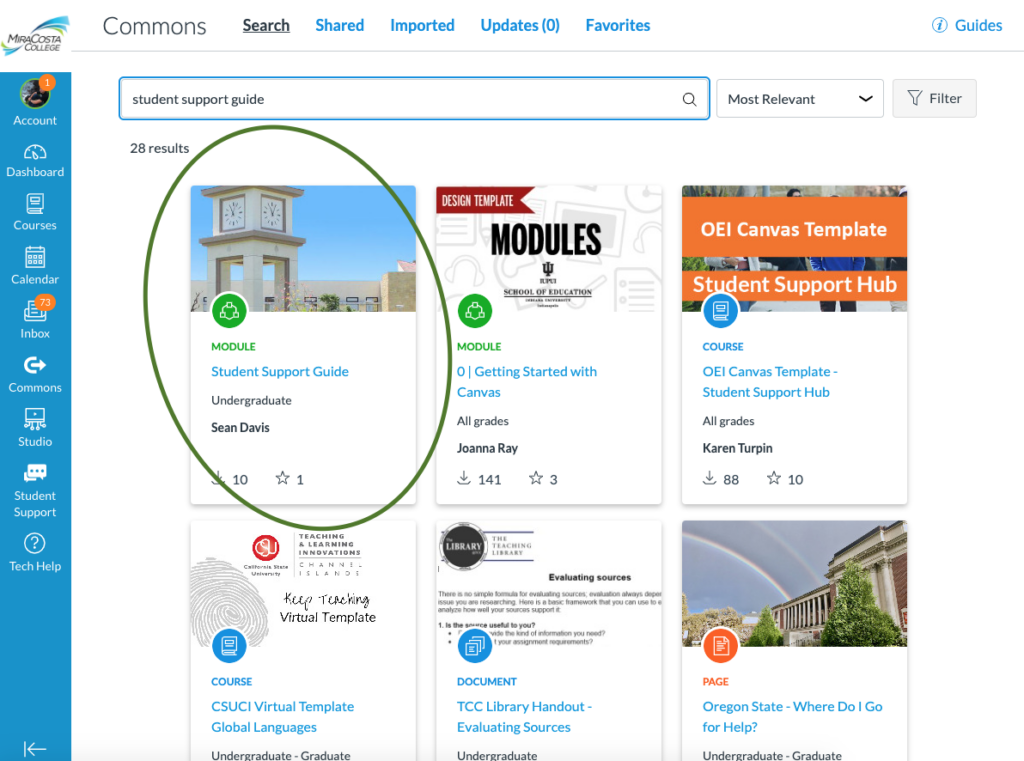Preparing for Summer 2021 Online Student Success
To all faculty teaching this summer – please take advantage of and share these important resources and opportunities for you and your students!
Support for You
- Instructional Design help – To request online teaching and course design support from our instructional designer, please fill out our request form. We’ll get you connected! (This is only available through June.)
- Tech Support – Canvas options include 24×7 phone and chat support. Just click the Tech Support button at lower left in Canvas! Zoom tech support for faculty is available through the MiraCosta employee help desk.
- Our Canvas start-of-term checklist can help you finalize your summer classes.
- The MiraCosta Online Class Quality Guidelines were significantly updated this spring and approved by the Academic Senate in May. Please review them to learn more about MiraCosta requirements and recommended practices for online instructors.
- MiraCosta technologies supporting online teaching and learning – please see the last section of this email for an overview, with links to learn more.
Support for Your Students
- Student Orientation to Online Learning – In collaboration with the library, I’ll be offering eight of these workshops at the start of the summer semester– see all dates and times on the TASC site and in Canvas announcements. These workshops help to familiarize students with the resources MiraCosta provides online to support them, as well as to adopt habits and attitudes of successful online students. Encourage your students to attend and, if you like, find out which of your students participated in order to incentivize their attendance.
- Online Student Support Access Points – the Student Support Hubin Canvas, accessed via the Student Support button on the left in Canvas gives quick access to online support from the library, STEM & MLC, online tutoring, writing center, counseling, career center, open computer lab staff, student help desk, health services, and more! The Help Hut on the MiraCosta website is also a quick way for students to connect with all kinds of support services including A&R and Financial Aid.
- Tech Support – Also at lower left in Canvas is a button for students to quickly access Tech Support options, including 24×7 phone and chat support from Canvas, and our local MiraCosta student help desk.
- Technology Needs? – Be sure to share the CARE form for students to fill out if they need a laptop and/or hotspot to succeed this summer.
MiraCosta’s Online Education Tools
Click the link immediately after each bullet for a detailed MiraCosta-specific overview of each item below. This is not intended as a comprehensive review of all technologies for online teaching supported by the college, but rather a quick look at the essentials. Please don’t hesitate to contact me if you have questions about these or other resources.
- Canvas – of course is the #1 tool for most faculty.
- Zoom – Make sure you are using MiraCosta’s professional-level Zoom account to get access to the full set of Zoom features.
- Canvas Studio – This great tool enables faculty and students to create videos while inside Canvas. Faculty can create interactive discussion or quiz activities based on video.
- Pronto is an incredible mobile-friendly and Canvas-integrated messaging platform that’s ready to use in every course.
- Pope Tech helps faculty detect and correct accessibility issues within Canvas. See also Creating Accessible Course Content for tips on ensuring all the content you add to Canvas is fully accessible.
- Ally automatically converts content you share through Canvas into multiple formats for students, allowing for listening rather than reading and better access to content on mobile devices.
- PlayPosit – This video interaction tool offers more complexity and options than Studio. Studio is a great place to start, but if you’re looking for more question types to add to your videos, PlayPosit is a great option.
- Turnitin – Many faculty use Turnitin to help students learn to properly cite sources and avoid plagiarism, as well as to assist with grading and peer review processes for written work.
- Productivity Software, Hardware, and other resources for working from home – this AIS website includes a number of links to helpful resources for being fully equipped when teaching from your home.
Happy summer teaching!
– Jim
Jim Julius, Ed.D.
Faculty Director, Online Education


